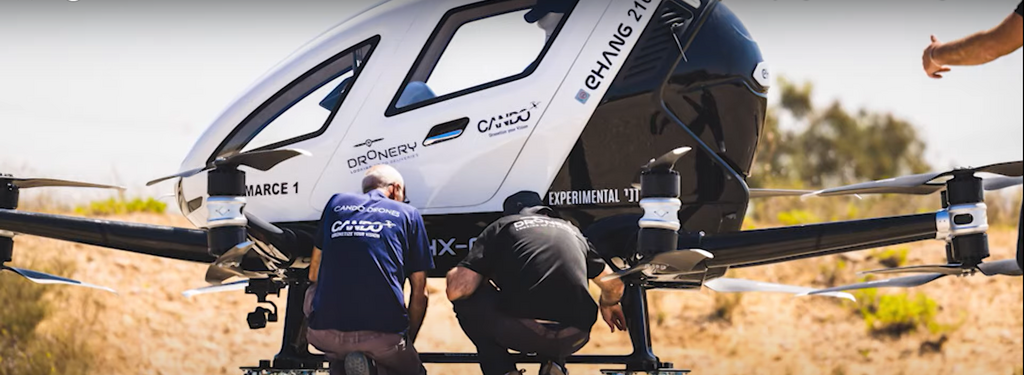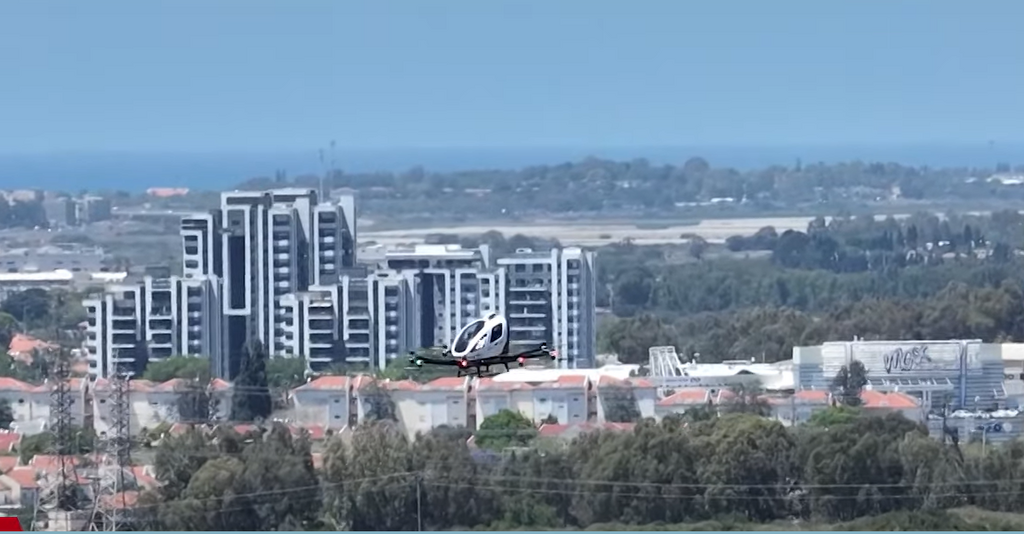Israel’s National Air Drone Initiative (INDI) has taken a significant step forward with another week of flight tests and demonstrations simultaneously taking place at various locations throughout Israel.
More stories:
The initiative is a partnership between government entities led by the Transportation Ministry, the Israel Innovation Authority, Ayalon Highways Ltd., and the Civil Aviation Authority of Israel (CAAI). The goal of the initiative is to support and promote an ecosystem through technology, regulation, and infrastructure for the use of advanced flight vehicles.
The initiative is focused on preparing the airspace for drone flights, with the intention of alleviating traffic congestion on Israel's roads, providing commercial and public services more efficiently, and creating a global competitive advantage for Israeli high-tech companies.
The initiative has been operating since 2019, with over NIS 60 million being invested in the next two years when test flights will be conducted on a large number of aircraft which will be able to transport people and goods in the future.
As part of the tests and experimental flights conducted throughout Israel last week, 11 drone operating companies and supporting companies operating in the airspace, conducted complex experiments to promote operational capabilities. Highlights include:
- For the first time, test flights of eVTOL autonomous electric aircraft with long-range capabilities were conducted in a managed urban airspace (also known as UTM – Unmanned Traffic Management), carrying heavy cargo loads, with a future option to fly people for long distances.
- AIR flew the AIR ZERO, manufactured in Israel, which can accommodate up to 2 passengers and a total payload of up to 220 kilograms, for a distance of up to 160 kilometers.
- Dronery, a subsidiary of Cando Drones, took off for the first time at the Pal-Yam landing pad in Caesarea with EHANG's innovative EH216-S aircraft, which can carry two passengers, a total of up to 220 kilograms, and fly a distance within 30 kilometers, in a fully autonomous flight with no pilot onboard, using EHANG’s intelligent command-and-control system.
- Cando Drones conducted delivery flights between Rami Levy Supermarket branches, night flights in the coastal strip of Hadera in collaboration with the municipality, and traffic monitoring activities at the Nesher-Bar-Yehuda junction.
- Down Wind conducted the longest flight in the initiative so far, covering approximately 29 kilometers, to open a flight path between Hillel Yaffe Medical Center and Rambam Medical Center.
- Autonomous urban flights were performed to assess the movement of goods from various branches in Yohananof.
- Sentrycs conducted a test to ensure a safe flight environment for authorized drones in collaboration with Flytech and Cando.
- ATI, in collaboration with TA Helicopters, examined eVTOL landing options in city centers and conducted a flight path from Kfar Truman to the center of Tel Aviv, with a landing in Reading.
These flights and tests contribute to advancing the development and implementation of innovative drone technologies in Israel. Several companies are participating in the drone initiative that began in 2019. These include Airways Drones Ltd, F.T. Aerial Solutions Ltd, Elsight, AGL, Air Taxi Israel (ATI), Down Wind, BROOK, Highlander Aviation, Cando Drones, and RoboTiCan.
Transportation Minister Brig. Gen. (Res) Miri Regev: “Under my leadership, the Transportation Ministry is working to strengthen Israel's position as a global development center for vehicle and transportation technologies, including aerial transportation. To this end, we promote joint experiments to test innovative technologies, such as Israel’s National Drone Initiative. This is the first initiative of its kind in the world for an extensive and multidisciplinary examination of new technologies, including the transportation of cargo and later, people.
“The collaborative project examines all the aspects – including regulation and legislative changes – involved in the commercial operation of drones, as an additional tool to deal with congestion.
“This is a new, intriguing, and challenging world with unlimited possibilities for us. We will do everything to ensure that Israel continues to lead and be at the forefront of global research and development on land, air, and sea."
Dror Bin, CEO of the Innovation Authority: “Israel is one of the global leaders in this field and today's experiment is an important milestone in the National Drone Initiative which gained international acclaim. The significance of these demonstrations lies in creating a regulatory sandbox that allows all relevant stakeholders to have practical experience before establishing a regulatory infrastructure that enables a wider economically viable model. The ability of Israeli startup companies in the drone industry to experiment within this sandbox provides them with a competitive advantage in the global market.”
Orly Stern, CEO of Ayalon Highways, said, “The National Drone Initiative is a project aimed at providing a variety of technological solutions to alleviate road congestion. The aircraft being tested now will be able to bypass traffic jams, and ease congestion by removing cars and trucks from the roads in conjunction with air traffic management systems. This will create a variety of air transportation options for regular and emergency cargo transfers.”
The first phase of the national drone initiative, which took place between 2019 and 2022, focused on small cargo flights. The current phase aims to increase payload capacity and range so that in the future, heavier cargo and passengers can be transported. Additionally, within the framework of the demonstrations, a "system of aerial routes in the skies" is being developed, enabling continuous flight operations in the airspace, allowing multiple drones and different aircraft to fly simultaneously for various purposes, including healthcare, commerce, security, safety, and more.
The Drone Initiative also addresses airspace regulation and the creation of regulatory infrastructure for autonomous flying vehicles for public benefit. Over the past three years, more than 19,000 sorties have been conducted in urban and rural areas as part of the initiative.
In the next two years, the participating companies in the Initiative will continue to conduct flights throughout the country for one week each month. The flights will take place in controlled airspace, throughout Israel covering long distances of up to 150 kilometers, while carrying heavier payloads, including, in the future, drones that will be able to carry people from one location to another.
The initiative operates in collaboration with additional commercial and public entities such as the Israeli Air Force, Israel Airports Authority Ltd., local municipalities, and other relevant entities. Ayalon Highways will continue to serve as the pilot site for conducting the demonstrations and will provide the companies with space in its metropolitan control and monitoring center.





